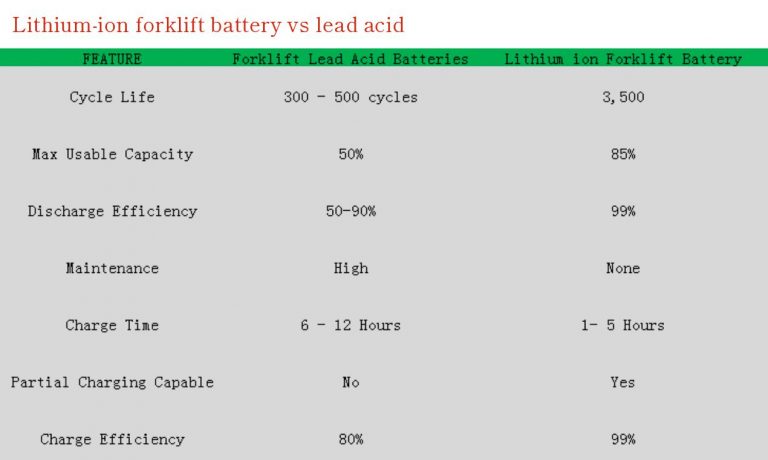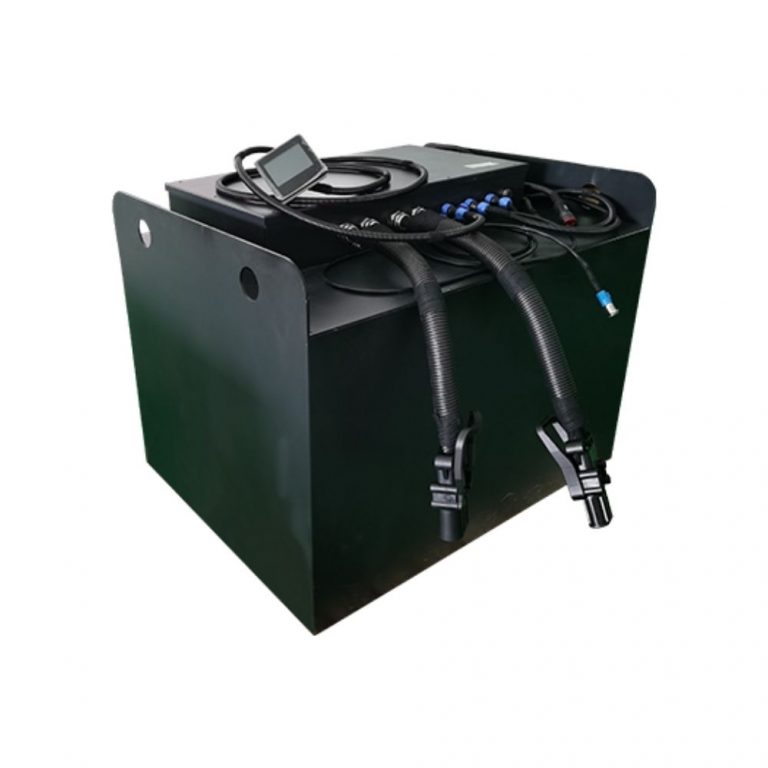A forklift battery’s weight range can vastly differ depending on its capacity, size, and construction. Smaller 12-volt versions would typically weigh between 70 to 100 pounds while larger 48-volts could pack up 2 thousand – or more!
Lithium-ion forklift battery vs lead acid
Finding the right forklift battery is essential to power your business, and lithium-ion batteries offer superior performance that helps you save money in both the short term and long run. With fewer maintenance needs and a longer lifespan, making them more efficient in the long run – but also safer with no risk of explosions or acid spills. Initially pricier than traditional models yet offering substantial cost savings when compared over their lifespan; Lithium forklift battery advanced energy solutions make an invaluable investment through dependable power performance at every turn!

Table of Contents
How often do I need to replace my forklift battery?
A well-maintained forklift battery can last anywhere from 5 to 7 years, giving you a big bang for your buck! However, it’s important to stay vigilant and monitor the performance of your equipment. Consider replacing a battery with decreased capacity or prolonged charging time before any issues arise – plus, setting up regular maintenance checks will help extend its lifespan even further.
How do I know when my forklift battery needs to be replaced?
When it comes to forklift battery performance, vigilance is key. You’ll want to keep an eye out for signs that the battery needs replacing: decreased run times or frequent charging are strong indicators and physical damage like cracks and leaks should be addressed promptly.
What is the warranty on a forklift battery?
Manufacturer and the type of battery. Typically, new forklift batteries come with warranties ranging from 1 to 5 years. It’s important to carefully
Is lithium-ion forklift battery safety
With lithium-ion batteries, you can enjoy green charging with zero hazardous gases emitted. Charge anywhere – even aside from a busy factory floor – and soar up efficiency levels as the battery charges directly inside your forklift!
Where are lithium-ion batteries made?
Lithium-ion batteries are made in several countries such as China, Japan, South Korea, the US, and Europe. Major manufacturers include Panasonic, LG Chem, Samsung SDI, and CATL. The production location varies by manufacturer and their facilities. China, Japan, South Korea, the US, and Europe. Major manufacturers include Panasonic, LG Chem, Samsung SDI, and CATL. Seastar Battery is the largest manufacturer of forklift batteries in China
How to Charge a Lithium Ion Battery
- Use the right charger.
- Connect the charger securely to the battery and an electrical outlet.
- Check the charging status.
- Charge until full.
- Disconnect the charger.
Remember to always follow the manufacturer’s instructions for safe and proper charging.
What is the Lithium forklift batteries’ lifespan?
Lithium forklift batteries can up to 8-10 years or 5000-7000 cycles.
What is the best battery for a forklift?
Lithium-iron phosphate batteries are the preferred choice when it comes to forklift applications. Not only do they offer more energy, last longer, and recharge quicker than traditional lead-acid units – but their temperature range is also improved for superior safety performance!
How to charge a forklift battery?
Just connect your high-quality charger tailored to the voltage and type of your specific battery, plug it into a power source, then wait until full charge.
How do I properly charge my Lithium forklift battery to maximize its performance?
Effectively getting the most out of your Lithium forklift battery requires precision and care. Using a charger specifically designed for these types of batteries is an absolute must, as charging monitoring is key to preventing overcharging and power drains from extreme temperatures. Keeping it at around 80% capacity during regular use will ensure daily performance needs are met; topping up before long periods in storage can help you make sure your battery remains ready when needed!
How much does a forklift battery cost?
5 Key Considerations Before Buying a Forklift Battery
Maximize the performance of your forklift by getting a battery that fits and provides the right amount of power. Here are 5 things to consider when shopping for a forklift battery:
- Voltage Compatibility – Forklifts use either 36-volt or 48-volt batteries, so be sure to check which voltage your lift truck can handle to avoid equipment damage.
- Battery Compartment Size – Measure the dimensions of the battery compartment in inches (width, depth, and height) to ensure that you get a battery that fits.
- Amp Hour Capacity – Choose a battery with a high ampere-hour (AH) capacity that can fit in the compartment to maximize power and run time.
- Minimum Counterweight Requirement – Check the forklift’s data plate or owner’s manual to determine the minimum battery weight. Installing an underweight battery can cause stability issues and safety hazards.
- Connector Type, Cable Position, and Cable Lengths – Know where the battery plugs into the forklift, how long the battery cable needs to be, and the color and position of the connectors.
Did you know that switching to lithium-ion batteries can significantly improve your business’s profitability? Despite their higher initial cost, lithium-ion batteries are:
More energy-efficient and store more energy in a smaller unit
Do not require maintenance, watering, or replacement
The average price range of forklift batteries is from $2,000 to $6,000, while charger prices range from $500 to $3,000, depending on the specifications. Although lead-acid batteries are cheaper, they have significant drawbacks like inefficiency and maintenance requirements.
Replacing lead-acid with Li-ion batteries may require specialist equipment adaptation and charging stations. Keep in mind the difficulty of recycling.
How much does car battery weigh
Standard lead-acid batteries weighing 30-50 pounds. However, battery capacity, construction, and features can alter weight. As the auto industry advances, lithium-ion batteries offer a lighter option, averaging 20-30 pounds.
Car battery how many volts
Car batteries normally have a 12-volt rating, but electric and hybrid vehicles kick it up a notch with systems that range from 200 to 400 volts
